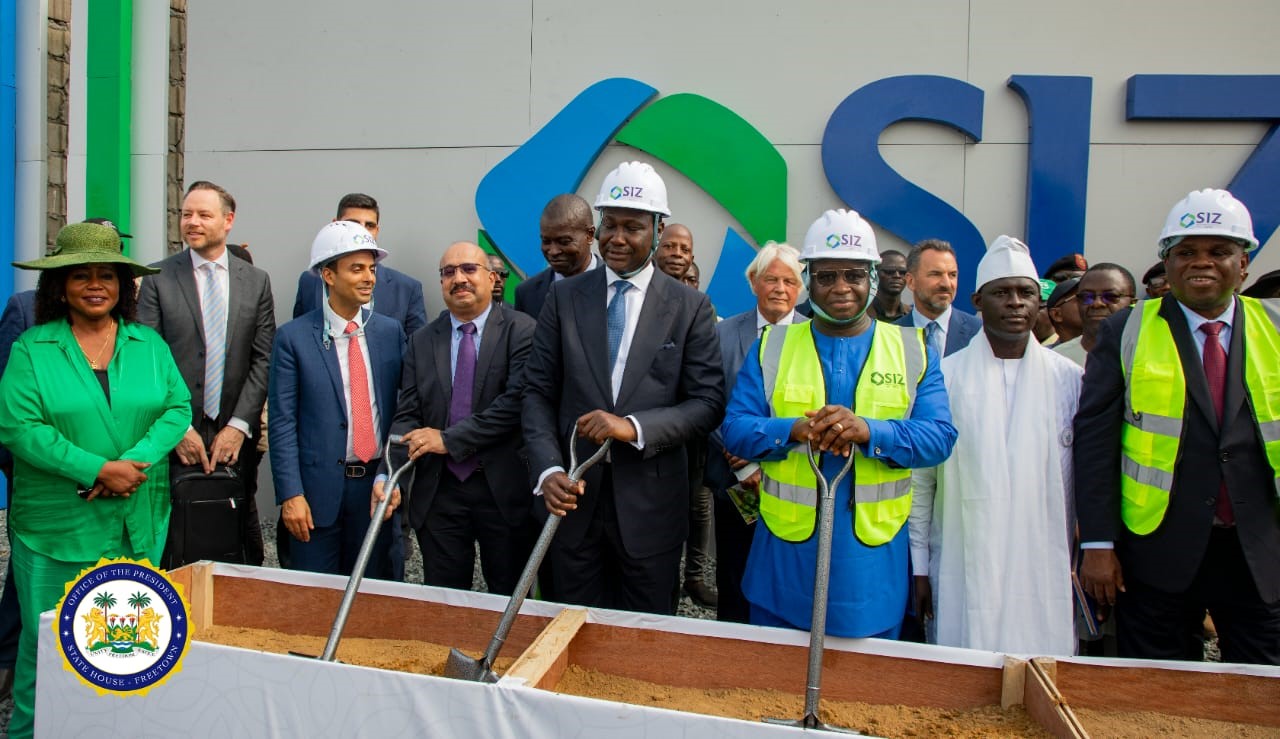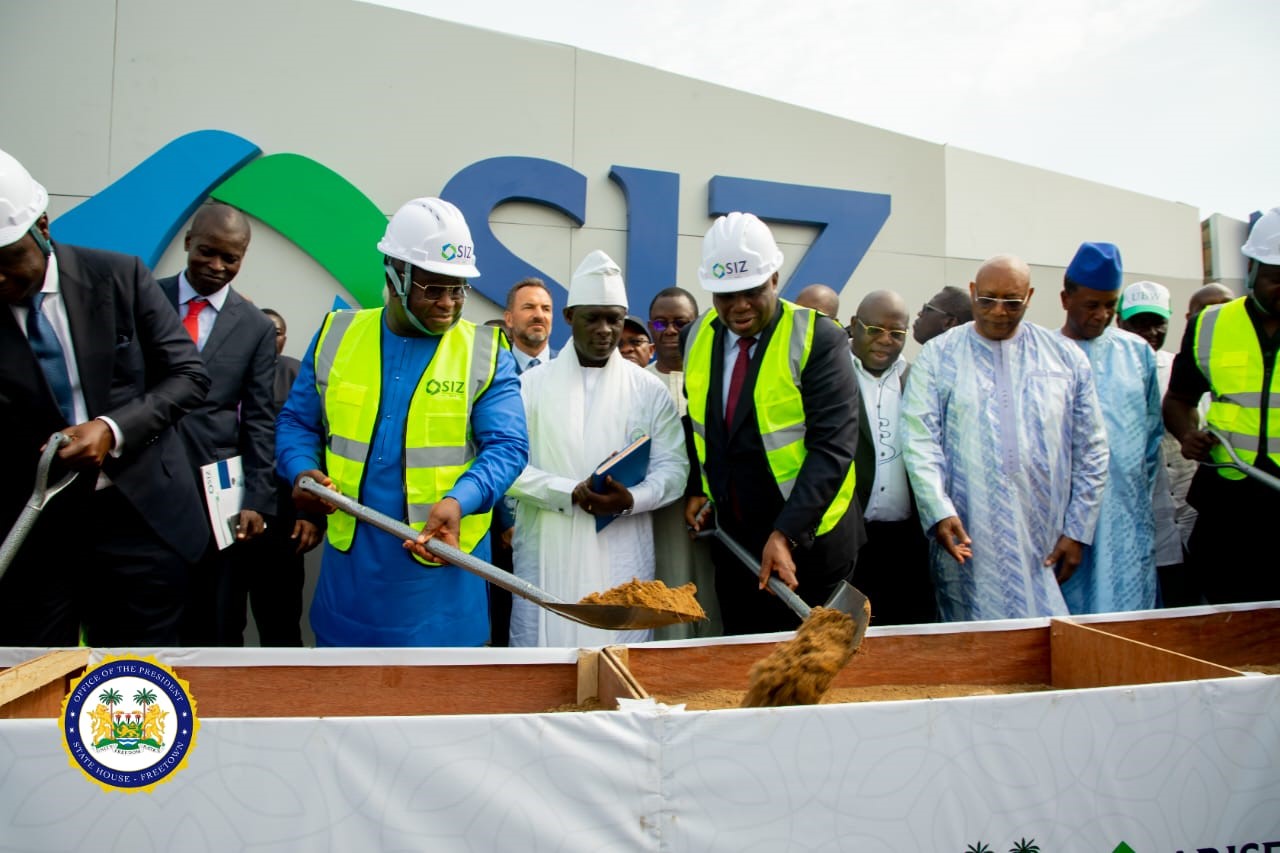His Excellency President Dr Julius Maada Bio has launched the groundbreaking ceremony for the development of the Special Koya Industrial Zone, SIZ-Koya, a joint venture between the Republic of Sierra Leone and ARISE Integrated Industrial Platforms, IIP.
The special economic zone, a joint venture between the Republic of Sierra Leone and ARISE Integrated Industrial Platforms, will be producing goods locally to replace expensive imports for the benefit of all Sierra Leonians.
The SIZ-Koya investment programme will be constructed on 1,600 hectares of land with a dedicated area for exports and it will be environmentally friendly, expected to be powered by 100 megawatts of gas energy.

President Julius Maada Bio said: “I am delighted to be at this event today, particularly as it is an actualisation of the vision, I presented in my manifesto in 2018. It is also a welcome outcome of visits to Special Economic Zones in Gabon, Rwanda, and other countries, and of partnerships and business relationships negotiated in the best interests of Sierra Leone over the last five years.
“In my 2018 manifesto, I observed that it is possible to increase the manufacturing sector’s share of GDP from less than 2%, where it was then, to at least 5% in 5 years. We, therefore, zoomed in on this in our national development plan. With germane policy actions detailed in both our manifesto and national development plan, including improving the environment for manufacturing industrialisation, we have exceeded the 5% target we set ourselves, and we are now closer to double digit figures.
“With agro-value addition over the last five years, Sierra Leone is now a net exporter of vegetable oil and also exports margarine and other palm-oil-based products. Certainly, constraints around improving infrastructure and providing finance for entrepreneurs persist, but my government is determined to build a diverse economy by significantly increasing the contribution of a competitive manufacturing sector to GDP.”
President Bio observed that a stronger manufacturing sector in the country that had access to regional and international markets and, therefore, would support foreign currency inflows, adding that the ECOWAS Trade Liberalisation Scheme had given custom-free access to the ECOWAS market.
He went on to say that the African Continental Free Trade Area, to which Sierra Leone had already acceded, would significantly promote intra-African trade and could enable the country access a range of other markets under the UK Generalised Scheme of Preferences, the EU’s “Everything But Arms” scheme, India’s trade-related South-South cooperation and more.
“My government has, therefore, developed a comprehensive Special Economic Zones (SEZ) policy that harmonises the needs of all stakeholders, provides an attractive, fair, predictable, stable, and sustainable ecosystem, provides for local skills development, technology transfers, and supply chains, supports the full embeddedness of feeder micro-entrepreneurs at the supply and local marketing ends, and ensures that the zones operate in accordance with international best practices.
“The Afreximbank, the Africa Finance Corporation and ARISE have all assured us of financing zone development, especially in ensuring that the facilities meet the highest international standards and, therefore, attract the highest calibre of private investors. Be assured that my government will play its own part,” President Bio reassured.
Logistics Value Chain Director of Arise IIP, Jesper H. Boll said Arise launched its first special economic zone in Gabon in 2010 and that today, that zone has generated 34 thousand direct jobs and is handling one million cubic meters of wood per year.
He said: “In a sustainable and carbon neutral manner – and as a result Gabon is the second largest exporter of veneer sheets in the world today. We would not have been able to accomplish this, without favorable social and economic conditions locally – and we see similarly favorable conditions in Sierra Leone. There is peace, rule of law, respect of legal contracts, a stable economy and a free press.
“But most importantly is the specific mindset of the people of Sierra Leone; you live together, you worship together and you have a civil society openly speaking up and debating important topics.
“It took Arise 10 years to fully develop the special economic zone in Gabon. It was much faster when we did it in Togo. And it was even faster in Benin, where we are in the process of executing a cotton transformation plan requiring 400,000 direct jobs.
“More than 2 billion Dollars has been invested into core infrastructure under the Arise portfolio with strong backing from Africa Finance Corporation and Africa Transformation and Industrialization Fund.
“Sierra Leone is heavily dependent on importation of basic goods such as sugar and rice – rice which costs 50% more than what it did a year ago. The special economic zone will be producing goods locally to replace expensive imports for the benefit of all Sierra Leonians. But Sierra Leone has a huge potential for agriculture – not only to feed its people but also to export. This Zone in Koya will facilitate transformation of agricultural products and dramatically transform the lives of farmers, just like we have done everywhere else where Arise that has set up.
“I am very excited to show you the plan we have laid out for this special economic zone. The whole zone will cover 1,600 HA fully build up; a single window building with government authorities will come up where we are seated today right next to the highway; it will have an area dedicated for import substitution and for export-oriented products. The first three factories are being set up as we speak; a ceramic tiles manufacturing unit – a non-ferrous metals recycling plant and a pharmaceutical unit producing capsules and injectables; it will be powered by a 100 MWh natural gas power plant that we will install; and a customs bonded inland container depot servicing the factories; it will have a dedicated river port for moving of cargo on the waterways; and in addition to this we are already this year kickstarting a mangrove conservation project on the river bordering the zone.
“An important factor to the success of the zone is connectivity to the farmlands, to the ports and to the neighboring countries. This is why Arise is extending the current rail network beyond the Pepel Tonkolili line; to Guinea and to the other mines and economic centers in the country.
“And industry needs people so we are bringing a passenger train into Sierra Leone that will transport passenger and workforce between the provinces. The train is ready, and it is on the way to Sierra Leone.
“Only by integrating the rail network with Pepel port and Koya special economic zone will we unlock the true potential of the country”.
He encouraged all Sierra Leonians irrespective of their circumstances to embrace this development, adding that the industrialization journey starts now and it has economic, social and sustainable benefits.
“We need to look forward and move with determination – many other African countries are already on this journey and now Sierra Leone is as well. I wish to thank President Bio for his bold vision of industrialization and his courage to kickstart the transformation process; not only transformation of raw material, but transformation of the country of Sierra Leone.” Jesper H. Boll stated.
President and Chief Executive Officer of African Finance Cooperation, Samalia Zubairu, said Sierra Leone and the African continent were faced with a lot of challenges around food security, inflation and the exchange rate, among others.
That, according to him, was a result of the fact that the economies had not transformed with lots of primary focus, lots of exports of basic raw materials, and significant imports of goods that could be produced in the country.
Mr. Zubairu said: “The focus here today is to start another journey whereby we would embark on significant import substitutions, significant value addition, and value retention that will target not just Sierra Leone and Sierra Leoneans but the wider African continent. So, we have a couple of initiatives, such as the African Continental Free Trade Area and the ECOWAS Free Market, all of which don’t mean much if we cannot produce goods locally from our economy. And this is the beginning of a journey for that process to commence.
“We are not going to spend as much time here in Sierra Leone as we spent in Benin. So, I want to assure you, His Excellency, that one of the things we are focused on is how to execute because we have paid special attention to lessons from other countries where we have implemented similar projects. This is going to be done in a very meticulous way because the choice of the factory we are going to construct is pharmaceutical, which is not inconsistent with or misaligned with the challenges we have faced in the past,” he revealed.
President of AFREXIMBANK, Professor Benedict Oramah, while acknowledging His Excellency President Julius Maada Bio, said, “I am honoured to celebrate with the government and the people of Sierra Leone the groundbreaking ceremony for the launch of the Special Economic Zone.
“I want to take this opportunity to congratulate the people and government of Sierra Leone on the auspicious occasion of Independence Day. On the eve of independence, you have decided that this programme will be launched. We thank His Excellency President Bio and the management and partners of ARISE IIP for their partnership with the AFRIXIMBANK on this historic investment venture.
“Since the mid-1990s, special economic zones have become opportunities for industry-led economic development across the world. Special Economic Zones have become key instruments of industrial policies, especially in economies that seek to industrialise their needs from agricultural products. During the last two and a half decades, the number of economic zones worldwide has increased from 500 in 1995 to about 7,000 in 2022, of which only 440 are in Africa,” he disclosed.
The Government of Sierra Leone on 17th January, 2023 signed a lease agreement with ARISE Integrated Industrial Platforms Ltd (ARISE IIP) for the development, expansion and management of the Pepel Port and Pepel-Tonkolili Railway.
After a thorough assessment of ARISE IIP by looking at the company’s profile and its remarkable achievements in other parts of Africa where it has a presence some have described the agreement signed as a landmark achievement that will serve as a game changer provided things work out well.

